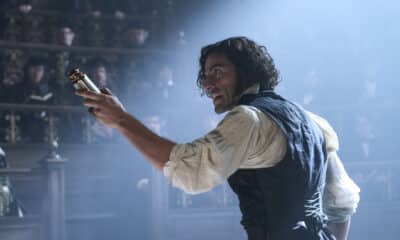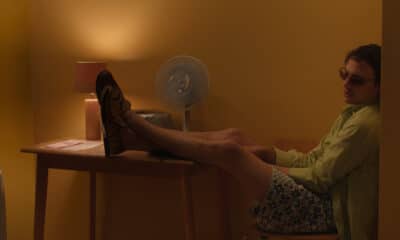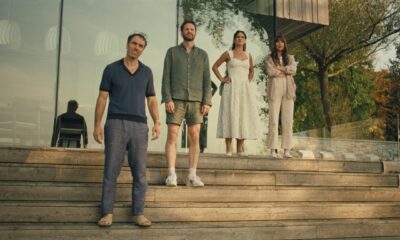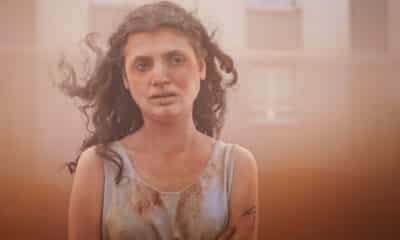This weekend saw the launch of the 2019 Transilvania International Film Festival which is taking place down here in Cluj in the northwestern area of Romania. The growing festival is now in its 18th year and this edition looks like it could be the biggest yet.

Photo Credit: THN
Proceedings kicked off in style over the weekend with one of Hollywood’s biggest players in attendance, none other than Nicolas Cage, here to receive the Transilvania Trophy for Special Contribution to World Cinema, as well as introduce two of his films, his balletic 1997 action movie Face/Off, as well as last year’s bonkers-though-brilliant horror film, Mandy (which screened in the grounds of Bontida Castle, just outside of town.
Prior to the screening, Cage took part in a 90-minute-long masterclass in a hotel in the city where he dissected his career, and offered musings on his acting method, winning the Academy Award in 1996 for Leaving Las Vegas, and also those amazing Internet memes that are constantly popping up all over the web.

Photo Credit: THN
The actor was candid in his answers, delivered to a packed conference room in Cluj on Sunday morning.
He commented on the ‘super 8 feeling,’ a vibe he gets when the work is going particularly well. He explained: “The ‘super-8 feeling’ is – I got that concept from my childhood. My father gave my brother and I a Minolta super-8 camera. It was a beautiful little camera and it shot super 8 film – this was before videotape and what people use now, digital.”
“My brother and I would make movies in the back yard where we did The Unknown Circus, which was a story about a trapeze artist and it was a love triangle. We were making these movies at like eight and ten – making movies about love triangles – bizarre. But anyway, I was like a superhero who could like extend my arm and be like Plastic Man or Elastic Man. It was like a little tunnel at a park and I’d stick my arm in the tunnel and there would be another kid on the inside and he’d stick his arm out so it would seem like it had stretched. I’d put a power ring on – it was the Green Lantern – but we made these movies really from a place of bliss and joy of just wanting to tell the story. It wasn’t about money; it wasn’t about awards, it was just about the excitement of telling the story with a silly little super 8 camera.”
The actor went on, “We’d cut the film together – my dad gave us a cutting machine and we’d edit it. That, in my opinion, is the ‘Super 8 feeling and that’s the best way to make a movie. If I’m on a set, like with Raising Arizona, I said ‘I’m getting that Super 8 feeling,’ and Joel and Ethan [Coen] were like ‘good, keep going with that.’ With Mandy, with Panos Cosmatos, I said ‘I’m getting that super 8 feeling.’ So, to me, that is the most sincere form or process of making a movie.”

Photo credit:THN
Cage famously and deservedly landed an Oscar for his role in Mike Figgis’ 1995 film Leaving Las Vegas. The role of alcoholic Ben Sanderson came following a string of roles in romantic comedies like Honeymoon In Vegas and It Could Happen To You. Cage was asked whether he welcomed the gong and whether it was expected?
“I think Gary Oldman once said ‘the sound of applause is never to be ignored,’ so I’m thankful for the Academy Award. I’m particularly thankful for it because it comes from other filmmakers, other actors who saw something in the performance – fellow film enthusiasts, so that means a lot,” the actor said.
“To answer [the second part of] your question, no I did not foresee that. In fact, when I read the script to Leaving Las Vegas, and it was Ed Limato, my agent, who told me that this was the answer to all your prayers. He actually said that which says a lot him. Nobody wanted to make that movie in Hollywood. It was turned down by every studio, even independent companies didn’t want to make the movie. It was way too dark for anybody to consider, and I remember consciously saying to myself ‘well, I’m never going to win an Academy Award anyway, so why don’t I just make this movie. Let me do what I want.’ Lo and behold it happened, so by not wanting it and not thinking about it, comes to me, so that was maybe an interesting story, and again, the ‘Super 8 feeling’ – why you’re making the movie; you make it to get an Oscar? Well, that’s the wrong way to go about it.”
In recent times, Cage has been more active in video-on-demand projects, though hasn’t entered the television world (yet).
“[Television] has been excellent and it has really been a renaissance. I chose independent cinema and video on demand instead of long-form television,” Cage said.
“I was a little bit nervous about television because I like to be nimble, I like to move around. I didn’t want to be trapped in one location working with, you know, multiple directors and… it’s something that I’m open to doing but it would have to be really the right part, and it would have to be in the right place.”

Photo credit: THN
Cage went on to say that an actor from one of his uncle, Francis Ford Coppola’s greatest films, Apocalypse Now, which celebrates its 50th birthday in 2019, gave him some important career advice.
“Martin Sheen once said to me, and it was great advice; ‘the only thing that matters is – did you like where you were? Did you like the people you were working with?’ That is so important in no other place more than television because you will be with those people for a year at least, and you will be in that place for a year at least, and you can’t get out. So if you’re working with people that don’t share your enthusiasm or your creativity, or they want to impinge on that, you’re stuck. So, I would have to really trust my director, the producers, and I would have to like where I was.”
Clearly, Cage is influenced by his peers, but the same goes for those who have directed him over the years. Filmmakers like his uncle, Francis Ford Coppola, who directed him in his second movie, as Smokey in Rumblefish, through to other cinema greats like Martin Scorsese (Bringing Out The Dead) and the aforementioned John Woo on Face/Off. What did he gain from their influence?
“I asked Francis [Ford Coppola] ‘what makes an actor great?’ He just said the sheer personality of the man or the woman – that’s what makes the actor great, just the sheer personality. [I said to David Lynch [with whom Cage teamed with on Wild At Heart], ‘is it okay to have fun while I’m doing this,’ and he said ‘Nickster,’ he called me Nickster, ‘it’s not only okay for you to have fun but it’s necessary that you have fun because if you’re not having fun then the audience isn’t having fun.”
“Marty [Scorsese] was someone who so enthusiastic about movies – he would give me movies every day to watch; watch videotapes like The Red Shoes, because I liked Anton Walbrook in that movie, or he would give me Roger Corman’s Mask Of The Red Death to watch, and he was just infectious, his love of film is so – it’s so true. You can’t help but love it with him. I’ve had mostly great experiences,” Cage added.

Photo credit: THN
The actor went on to reference other directors’ influence.
“Mike Figgis was a great experience on Leaving Las Vegas, Werner [Herzog] was a great experience on Bad Lieutenant and last night’s movie [Face/Off] John Woo… John was somebody – we communicated through expression, not so much the words. He showed me his movie Bullet In The Head and I knew right away where I could go in terms of the size of the performance because that was really operatic and very emotional and on the edge of ‘is it too much, or not?’ I like that. I knew right away where he wanted me to go in terms of my performance. He was always going – he’s a dancer; ‘keep your back straight!’ Watching the movie last night, I was thinking, ‘thank God I kept my shoulders back when I’m shooting the guns’. I look better because I tend to sometimes slouch, and he didn’t like that. I got great notes from all these filmmakers. Andrew Niccol on Lord Of War – he was somebody who was very politically concerned and immersed, so that was a very political kind of experience in terms of filmmaking but I got something from all of them.”
Cage has worked with pretty much every modern great in terms of filmmaker, but it there anyone left on his list that he really wants to work with?
“Christopher Nolan is a director that I think is extraordinary, that is really at the top of his craft. I thought that Dunkirk was the best picture of that year.”

Photo credit: THN
Cage has entered the realms of directing just once (with Sonny back in 2002), but he was asked whether screenwriting was something that he’d like to attempt, or has attempted in the past.
“I did, once. It was a tragedy,” he smiled.
“I had the computer. I had the manuscript on my computer. It was a movie about… I had been influenced by a movie called Quadrophenia, based on The Who album, and I was telling the story of my experiences as a teenager and I wrote the script and I had it all in my computer. It was all done and I thought it was so cool because I had bought a Ferrari. I thought wow, I’ve got my Ferrari now, and I’ve got my script and my script was in my bag in my briefcase…”
It was here when things reportedly took a turn for the worse.
“I went to my Ferrari and I put my bag down behind the car and I was so excited by this car and how beautiful it was. I got in, started it and I backed up and ran over my briefcase and I smashed my computer [laughs]. I lost my manuscript and everything I had written for about one year. I didn’t have any copies of it. [I thought] I’m never going to write a script again. This is fate. I’ll just stick with film acting. That’s the last time I ever rode a Ferrari too.”
Related: Mandy review [LFF]
The biggest question came at the end of the masterclass when Cage asked what he thought about the massive craze to hit the Internet – the Cage Rage meme. So, how does he feel about it all?
“I take it in two ways. On the one hand, let’s say I have, let’s say some umbrage with it because, you know, the mash-ups are taking the outbursts out of context from the entire movie.”
He went on, “The movie is what, 90 minutes to two hours, but they’re taking like one choice scene and throwing it into a mix-mash of explosions or outbursts that I have in multiple movies and that’s what created Cage Rage. It’s just me really losing it and blowing up – and yes, it is, many times designed to be humourous when I do it, and I know, it’s funny. It’s very thought out and I really [inaudible]. I hope that people will look at it and [think] ‘maybe I should watch the movie and see how he got there – where did the character go to get to that outburst.’ In that regard, I don’t take umbrage with it, and in that regard I’m thankful.”
The actor added, “I feel that, in some ways, because it is a modern experience in terms of modern technology; the Internet wasn’t always there – and I am the most private person in terms of celebrity. I don’t want the celebrity; I’m actively anti-celebrity. I have no Twitter account. I have no Instagram. I have no Facebook. I don’t want to be seen. Nonetheless, everyone has a cell phone and everyone has a video camera on [their] cell phone if I don’t want to be seen, by virtue of the fact that I don’t, they want to find me anyway – they want to pull up the rock and look at me squirming around and get it on videotape and sell it to somebody. So, it’s useless. Absolutely useless, it’s going to happen whether I want it to or no. I’m about to become hermetically sealed.”
He finished off by summing all the madness up.
“The thing is, I think it works both ways. With the Internet culture and the meme, if you will, is part of the thing that keeps me relevant in this day and age, so be it. I only ask that if you were excited by the meme, or the facial expression, or the bug eyes, or the outburst… check out the movie too. You might like it.”
The Transilvania International Film Festival 2019 runs until Sunday 9th June.

Latest Posts
-


Home Entertainment
/ 13 hours ago‘Piglet’ review: Dir. Andrea M. Catinella (2025)
Before settling in to watch Andrea M. Catinella’s Piglet, it is important to point...
By Kat Hughes -


Film Trailers
/ 13 hours ago‘Black Phone 2’ trailer; horror sequel lines up October release
A new trailer for Black Phone 2 has landed online from Universal Pictures. The...
By Paul Heath -


Netflix
/ 21 hours agoWatch the first six minutes of ‘Wednesday’ season 2
Netflix has dropped the first six minutes of the first episode in season two...
By Paul Heath -


Film News
/ 21 hours agoGuillermo del Toro’s ‘Frankenstein’ is unleashed at Netflix’s TUDUM event
Netflix has gifted the first proper look at Guillermo del Toro’s Frankenstein at a...
By Paul Heath







